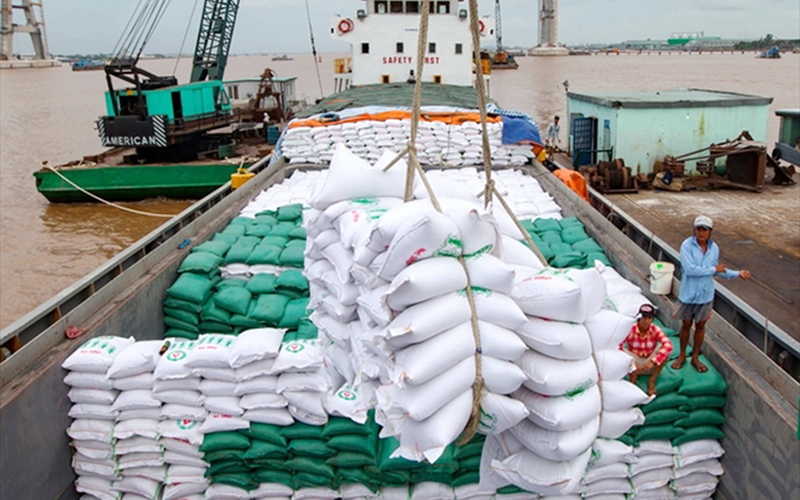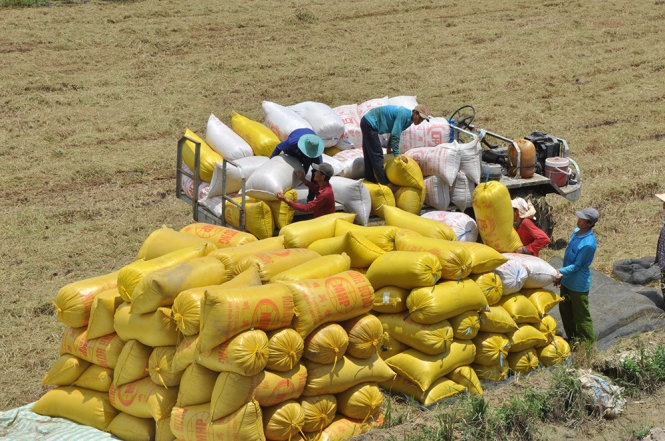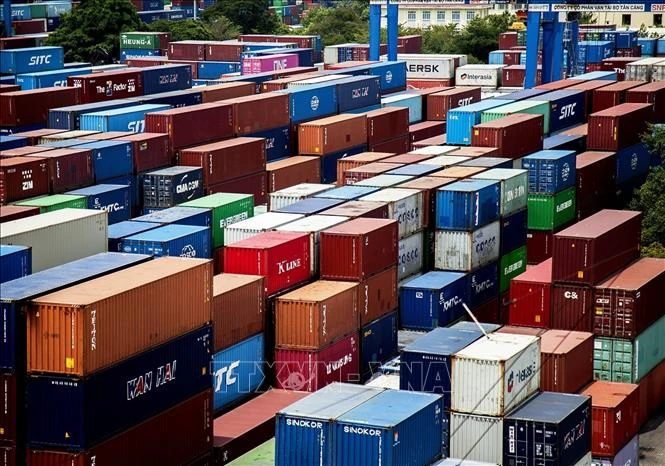The figures represent increases of 25.1% in volume and 5.8% in value over the same period last year, said the MARD.
 |
| Vietnam exports over 5 million tonnes of rice in seven months. (Photo: VOV) |
Farmers harvested 25 million tonnes of rice on 3.82 million hectares of farming land, with the average yield standing at 6.56 tonnes per hectare.
Data compiled by the Vietnam Food Association on August 3 indicates that the export price of 5% broken rice was US$559 per tonne, while that of the 25% broken rice was US$535 per tonne.
Rice trading is forecast to continue to increase in the world market that will therefore impact the Vietnamese rice market. However, rice exporting enterprises are still waiting for India's new policy following its rice export ban last year.
 |
| Photo for illustration. (Source: congthuong.vn) |
India currently holds about 40% of the global rice export market. If it moves to lift or relax the ban, then it will pull rice prices in major exporting countries in the world down to quite low levels.
Moreover, local enterprises are also facing difficulties in purchasing rice within the domestic market as rice prices decrease, warehouses limit milling and rain delays the summer-autumn rice harvest.
Industry experts have recommended that businesses should focus on purchasing summer-autumn rice to have a full inventory before signing contracts to avoid risks.
The country's rice production is expected to reach 43 million tonnes for the entire year. This output will thereby ensure domestic consumption and export demand of more than eight million tonnes, earning over US$5 billion as the set target.
Lucrative Halal market creates great opportunity for Vietnamese exports
 |
| Businesses and partners discuss on Halal products for export. (Photo: hanoimoi.vn) |
The billion-USD Halal market, fueled by a surging global Muslim population, is considered one of the drivers for Vietnam's exports in the future, reported Vietnam News Agency.
DDA Vietnam, which specialises in organic products, is one of the Vietnamese enterprises seeking opportunities in the market.
Nguyen Thi Anh Nguyet, a representative of company, stated that it is completing the Halal certification to export organic calcium products made from chicken eggshells to Middle Eastern countries.
Statistics show that nearly 60 provinces and cities nationwide have exported products to the global Halal market, but only about 1,000 enterprises have been certified.
With strict regulations of Halal standards, Vietnam's current exports are mainly farm produce, and raw materials for some industries. Therefore, it holds a modest position among global suppliers of these products. Additionally, the Halal market is still very new to many domestic enterprises, despite Vietnam's advantages in raw materials and geographical location.
According to Nguyen Minh Phuong from the Department of Asia – Africa Markets under the Ministry of Industry and Trade (MoIT), the global Halal market holds great potential, with 25% of the world's population being Muslim and the total trade value of Halal products hitting an estimated 2.3 trillion USD and continuing to grow.
Products with strong demand include food, cosmetics, pharmaceuticals, and fashion items. Prices of Halal products are usually 5-10% higher and consumers who want to use Halal products are willing to pay for them.
However, to be able to successfully penetrate and compete with other rival suppliers in the market, businesses need to learn and grasp business practices, consumption culture, and market regulations, said experts.
Le Chau Hai Vu, a consultant for building Halal food quality, said businesses need to have accurate knowledge of market trend, religious practices, business and consumption culture, and preferences, and meet specific standards for packaging and advertising.
Vietnamese Trade Counsellor in Saudi Arabia Tran Trong Kim advised businesses to conduct market research and inquire about regulations of host countries regarding quality management and food safety.
For deals with import businesses in this region, it is necessary to sign payment contracts using letters of credit (LC) with a deposit, Kim said, warning that exporters should not pay in advance any fees related to contract brokerage or invoice issuance as these are common fraudulent practices.
The MoIT is building a project to support exporters and producers of Halal products, aiming to further boost the export. Additionally, the National Trade Promotion Programme is also a channel to support businesses in participating in networking and trade promotion activities with the Halal markets.
Assoc. Prof. Dr. Nguyen Thuong Lang from the National Economics University said that with its foreign trade development strategy, Vietnam should focus on effectively and sustainably exploiting the Halal market.
Chinese EV maker sees Vietnam as key market in Southeast Asia
 |
| The EV maker BYD introduces its brand with three key lines on July 18 in HCM City (Photo: VNA) |
Chinese electric vehicle (EV) maker BYD has chosen Vietnam as a key market for its development in Southeast Asia, Vo Minh Luc, CEO of BYD Auto Vietnam, has said.
According to Vietnam News Agency, the world's largest EV manufacturer has officially introduced its advanced EV models in Vietnam, and announced its strategy in the market.
In an interview granted to the Vietnam News Agency, Luc said as the world's largest new-energy vehicle manufacturer, BYD possesses a range of proprietary technologies, adding BYD's business has been implemented in over 80 countries and territories, and this number is expected to continue increasing in the future.
BYD considers Vietnam a key market, and also the final market in the region, he said, stressing that Vietnam is a very promising market with a population exceeding 100 million people, consistently high GDP growth, and continuously invested and improved infrastructure.
With its distribution network across the country, BYD hopes to offer Vietnamese customers an opportunity to experience technologies applied in BYD's products, contributing to a greener and more sustainable life.
According to Luc, the Vietnamese market is very dynamic and greatly potential. He said that BYD will continue to introduce new products to consumers, providing them with more choices, while promoting green and smart mobility solutions, towards contributing to the goals of energy saving and carbon emission reduction in Vietnam.
On July 18, the EV maker introduced its brand with three key lines, namely BYD DOLPHIN, BYD ATTO 3 and BYD SEAL, which have price tags starting from 659 million VND (26,037 USD).
Liu Xueliang, general manager of BYD Asia-Pacific auto sales division, said the firm plans to officially open 10 showrooms in Hanoi, Ho Chi Minh City, and Binh Duong, Ba Ria-Vung Tau, Thanh Hoa, Quang Ninh, and Bac Giang provinces, adding that the figure will be increased to 100 nationwide within three years.
In addition, BYD has inked cooperation agreements with three banks and four insurance partners to carry out loan support programmes and bring exclusive incentives to customers. It has also shaken hands with 10 charging equipment providers and operators in Vietnam, while actively seeking to set up more partnerships, aiming to contribute to promoting the new energy vehicle industry in Vietnam and the country’s green economy.
Vietnam's green logistics industry becomes attractive to investors: Insiders
 |
| Containers in Cat Lat Port, HCM City (Photo: VNA) |
Vietnam's logistics industry is witnessing significant changes and has become an attractive destination for businesses and investors, insiders said at a series of seminars held within the on-going Vietnam International Logistics Exhibition (VILOG) 2024 in Ho Chi Minh City, reported Vietnam News Agency.
Vietnam becomes an important production and trade hub in the world, along with a boom of e-commerce and rapid growth of global supply chains.
Deputy Minister of Industry and Trade Phan Thi Thang said the industry plays a crucial role in helping Vietnam's economy overcome difficulties during the COVID-19 pandemic, as well as current global geopolitical fluctuations.
It has contributed to the continuous growth of Vietnam's total import- export turnover, surpassing 600 billion USD in 2021, 700 billion USD in 2022, and reaching 683 billion USD in 2023. The figure hit over 369.6 billion USD in the first six months of 2024, up 16% year-on-year. The national strategy on green growth for the 2021-2030 period with a vision to 2050 has set a target of "greening" economic sectors, boosting the restructuring of the economy in close association with the reform of the growth model. To realise the strategy, the Prime Minister has issued a national action plan on green growth in the 2021-230, in which logistic services are one of the 18 key themes. A logistics business has pointed out that a key factor in accelerating the industry’s growth is technology and collaboration within the symbiotic ecosystem.
According to the World Bank's report, Vietnam's Logistics Performance Index (LPI) reached 3.3 points in 2023, up from 3.27 points in 2018, ranking the country 43 out of the 154 countries worldwide and fifth among ASEAN countries. This is the highest score Vietnam has achieved since the inception of this study.
Vietnam is also among the top 10 emerging logistics markets, ranking 4th in terms of international logistics opportunities, and is considered one of the leading potential growth countries in Southeast Asia. Its growth target of 6.0% for 2024 has boosted confidence among logistics companies.
Particularly, the Government's strong push for public investment, especially in transport infrastructure such as the North-South Expressway, Long Thanh Airport, and high-speed rails also creats positive signs for the potential development of infrastructure serving the logistics industry.
According to Vietnam Report's research findings combined with the synthesis of experts' opinions, domestic maritime transport will go hand in hand with the development of the road network, and this is one of the trends shaping the logistics market in 2024 and next years.
Experts said that a key prerequisite for developing domestic maritime transport is connecting seaports with inland port systems, highways, and railways.
In the short term, logistics firms expect to simplify operational processes to reduce costs; train and improve the quality of human resources; expand the supply chain and explore new markets; strengthen after-sales activities to build customer loyalty; and increase investment in technology equipment to support digital transformation.
Dao Trong Khoa, Chairman of the Vietnam Logistics Business Association (VLA), said green logistics is not just a trend but has become a mandatory requirement and an important criterion for the logistics community to expand international markets and join global supply chains.
Issues related to digital transformation in customs, sustainable air logistics, and training green skill for the workforce will be crucial factors contributing to the green and sustainable development of Vietnam's logistics industry, Khoa stressed.
Vietnam's logistics service companies need to ensure an increase in both quantity and quality, especially in meeting requirements to participate in global supply chains, he went on./.